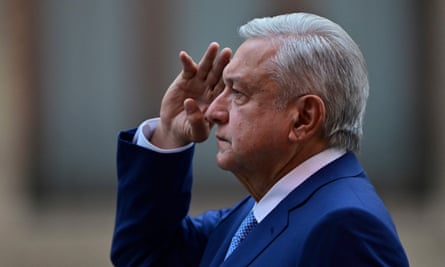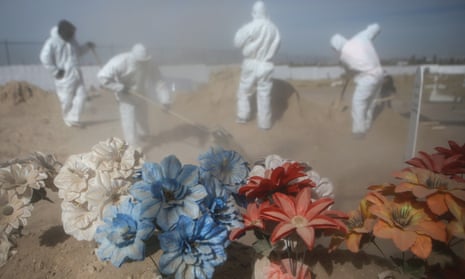It took just 83 days for Adriana Mejía to lose half her family, as Covid unleashed a Mexican tragedy whose full impact is only now becoming clear.
First to depart was her father, Juan, a 90-year-old carpenter who died at the family home in Mexico City last July after summoning his eight children to say goodbye. Two weeks later Mejía’s 55-year-old sister, Cecilia, who began feeling unwell as they buried their father, also lost her life. Two days later, on 3 August, Mejía lost her brother, Juan Carlos, then, 13 days after that, her brother-in-law, Germán.
Even then, Mejía’s trials were not over. Two days after Germán’s death a second sibling, Miguel Roberto, died too. On 6 October she lost her mother. Graciela Murillo Altamirano was 89 when she was pronounced dead at the same home where her husband had expired almost three months earlier.
“We’ve gone from rosary to rosary,” Mejía, a 46-year-old graphic designer from Mexico’s sprawling capital, said as she reflected on her family’s agony. “We just didn’t know when it would stop.”
Mexico’s Covid crisis has made fewer international headlines than the catastrophes in the US and Brazil, where almost 900,000 people have died, accounting for about a third of the global total, and the reckless responses of rightwing populists Donald Trump and Jair Bolsonaro have been condemned. Bolsonaro’s anti-scientific handling of a disease he calls a “bit of a cold” and the spread of a more infectious variant linked to the Amazon has earned his nation particular infamy on the world stage.
But the revelation this week that Mexico’s death toll was far higher than previously reported suggests a calamity of similar proportions has played out under its leader, the populist Andrés Manuel López Obrador. Last weekend Mexican officials discreetly acknowledged more than 294,000 Covid deaths – just shy of Brazil’s official death toll which was then 310,000. Brazil has a much larger population, with 212 million inhabitants compared with Mexico’s 126 million.

Mexico’s Covid tsar Hugo López-Gatell defended his government in a recent interview, telling the Financial Times: “Our conscience is very clear.”
“It’s a pandemic,” said the epidemiologist who in February caught Covid himself. “It would be senseless to think life would be normal.”
Many, however, believe the president’s cavalier approach hampered Mexico’s ability to control its epidemic by confusing citizens – with terrible consequences for families such as the Mejías.
Like Trump and Bolsonaro, López Obrador has downplayed the virus, continued to tour his country and embrace supporters and resisted containment measures such as lockdowns, social distancing and masks. “We’re doing well, the pandemic has been tamed,” the 67-year-old claimed last May when Mexico’s official death toll was about 9,000. In January, as Mexico was plunged into a devastating second wave, López-Gatell was photographed holidaying on an Oaxaca beach despite urging citizens to stay at home.
“When we think about worst performers, I think you rank Mexico, Brazil and the US together now,” said Eduardo González-Pier, a former Mexican health undersecretary. “These are the three big bad performers – and I think that has to do with the way governments responded to the pandemic.
“Before Biden, there were a lot of similarities in how these countries were run and how the pandemic was approached. Bolsonaro, Trump and López Obrador had a similar attitude: the denial, the delayed response, the minimisation of the severity, and also the idea of not suspending activities.”
Many believe that approach helped create a disaster of needlessly large proportions. “I’m not claiming Mexico could have experienced something like Vietnam or Taiwan, which are best performers. But what if they had had just an average type of response with the same mortality you would see from an average country?” asked González-Pier, an economist and health specialist.
“If you do the calculations you see … Mexico could have avoided 100,000 to 200,000 [deaths] … So that is the kind of damage that has been done.”

The behaviour and mixed messaging of politicians are not the only explanations for Mexico’s drama. Chronic underinvestment in healthcare meant hospitals were not adequately equipped or staffed when the pandemic hit. Some of the world’s highest rates of diabetes and obesity meant Mexico was especially vulnerable to Covid-19. “It just happened to be a virus that was particularly vicious with the type of chronic conditions that Mexicans have a high prevalence of – uncontrolled diabetes, hypertension, obesity, especially among younger and mature adults. And that, I guess, was bad luck,” González-Pier said.
Public health expert Carlos Alonso Reynoso said he still believed Mexico had fared better than Brazil where “a tragedy of unimaginable proportions” was unfolding and nearly 70,000 people died last month. But Mexico’s “confused and ambiguous” communication had taken a toll. “If the government’s message had been clearer and more concise perhaps the number of cases could have been reduced,” Reynoso said.
Five months after her mother’s death, Mejía said she believed her family had been “victims of the lack of information”. A psychologist is helping her come to terms with her bereavement. “I lost most of my family and yet I couldn’t cry until my mother died and the nightmare was over,” Mejía said. “That was the moment I was finally able to grasp everything that had happened.”
González-Pier said he was encouraged to see Mexico’s immunisation campaign, one of Latin America’s earliest, gathering pace. Mexico’s epidemic has slowed in recent weeks although some fear Holy Week celebrations, when families gather and tourists flock to beaches, could trigger a painful third wave like the one now shaking Chile.
“I think the Mexican population is still highly vulnerable,” the former health undersecretary warned, pointing to research suggesting only a quarter of the country had been exposed to the virus. “I wouldn’t be so sure we are through the worst.”
